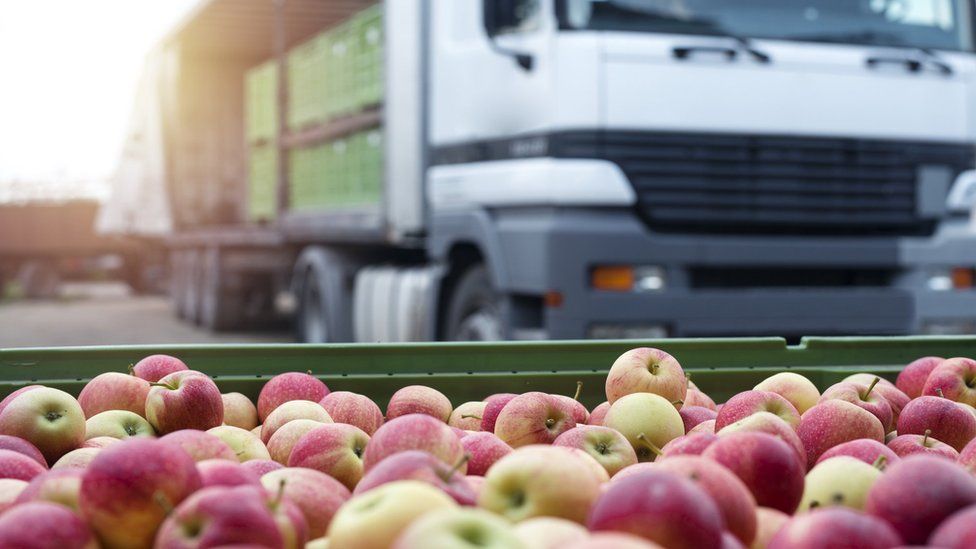NI Protocol: Food industry warns protocol is 'vital to trade'
- Published

Representatives of the Northern Ireland food industry have warned the UK government that scrapping the Northern Ireland Protocol could damage their businesses.
The protocol is the part of the Brexit deal which keeps Northern Ireland inside the European Union's (EU) single market for goods.
It prevents a hard border with the Republic of Ireland.
But it means checks on some goods arriving from other parts of the UK.
On Monday, the government will begin the process of making radical unilateral changes to the protocol.
In May, Foreign Secretary Liz Truss said she would bring forward a new law to Westminster.
Businesses which import Great Britain goods to Northern Ireland have experienced difficulties with the protocol as the new checks and controls add cost and complexity.
Food and horticulture importers have faced the greatest problems as those goods face the most onerous controls.
However exporters, including food exporters, have benefited because unlike other parts of the UK they have maintained frictionless access to EU markets.
Michael Bell, the executive director of the Northern Ireland Food and Drink Association (NIFDA), said the protocol has been "vital to ensuring continuity of trade in goods across the island of Ireland, and between Northern Ireland and Great Britain".
"For a majority of our members, the protocol is working. For a minority, there have been issues," he said.
"Some of these have been addressed to an extent by the various 'grace periods', and NIFDA has been working with government to highlight areas where improvements can be made and processes streamlined.
"Simply scrapping the protocol would only set us back.
"We must not forget that Brexit itself presented Northern Ireland food and drink companies with many major challenges, most of which have been resolved by the protocol whilst offering new opportunities."
That was echoed by the Northern Ireland Meat Exporters Association (NIMEA) who said the protocol, along with the UK-EU Trade and Cooperation Agreement, was providing "an effective and workable platform for trade between these islands and beyond".
Conall Donnelly, chief executive of NIMEA, said his members annually import about £200m in beef from Great Britain for further processing in Northern Ireland.
These imports are now subject to checks and controls but Mr Donnelly said the industry had coped with that.
He said: "Our members have adapted well to these checks and once they are complete, our members benefit from unfettered trade back to GB and onwards to the EU.
"This provides significant benefits relative to other UK and EU regions and our members are anxious that those benefits are protected.
"To facilitate trade it is essential that both the UK and EU commit to agreed solutions rather than either side taking unilateral action which risks retaliation from the other - potentially damaging trading relations in the process and jeopardising jobs and business opportunities in Northern Ireland."
Last week the Northern Ireland Dairy Council also warned the government about the possible impacts of taking unilateral action.
Food producers are understood to be particularly worried about the "dual regulatory regime" being proposed by the government.
That would mean that goods produced to both UK and EU standards could circulate in Northern Ireland.
Analysis: Food sector finds its voice
Some critics of the protocol, including Lord Frost, have poured scorn on the idea that there is an island of Ireland economy which the protocol protects.
However for the food industry, particularly the dairy sector, the reality is a very high degree of cross-border integration.
Products can move back and forward across the frontier several times in their processing journey.
So if unilateral changes to the protocol create ambiguity about the regulatory status of Northern Ireland goods, these supply chains will be under threat.
It's not surprising then that the food sector has found it voice.
Last month the foreign secretary said the new legislation will "remove regulatory barriers to goods made to UK standards being sold in Northern Ireland".
"Businesses will be able to choose between meeting UK or EU standards in a new dual regulatory regime," she added.
Food producers are concerned that would create confusion or ambiguity about whether their goods were being produced to EU standards and if they could access the single market.
Dairy Council chief executive, Mike Johnston, used the hypothetical example, that if wheat produced using pesticides banned by the EU was used as animal feed on Northern Ireland dairy farms, then the milk produced would not be permitted to cross the border.